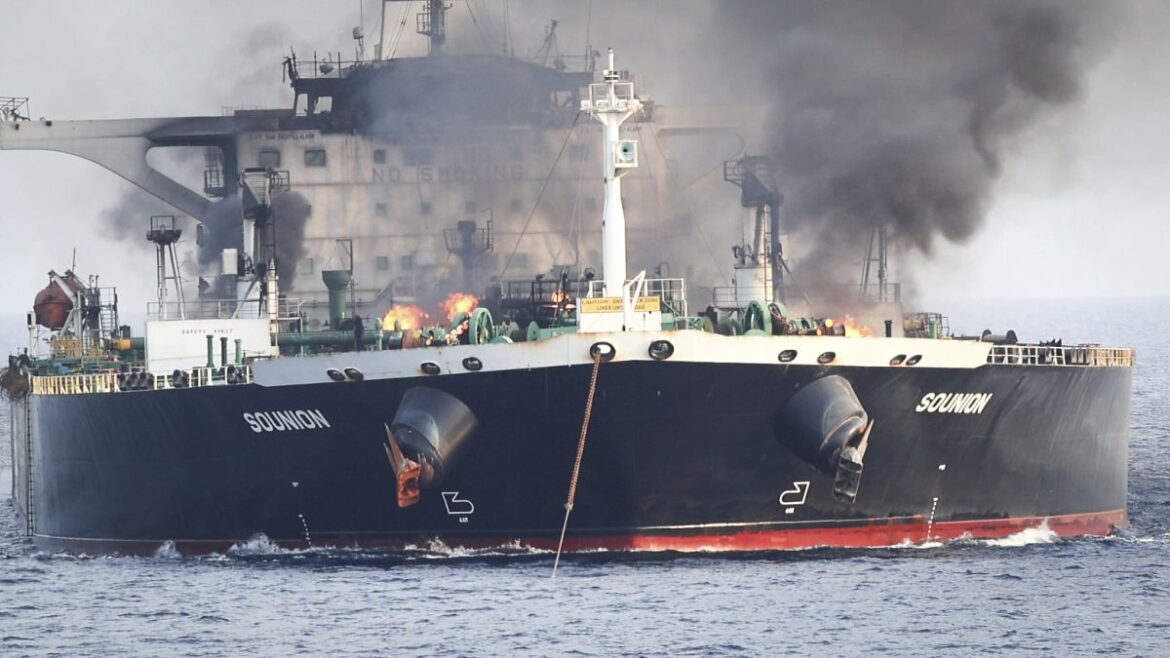The MV Sounion, which was carrying a million barrels of crude oil, was struck and then sabotaged with explosives by the Houthis as part of their campaign to support Hamas in its war against Israel in Gaza. Its spill would have been “four times larger” than that of the Exxon Valdez.
An oil tanker that burned for weeks in the Red Sea after being attacked by Houthi rebels in Yemen, risking a massive oil leak, has been salvaged, a salvage company said.
The tanker MV Sounion, carrying a million barrels of crude oil, was on course to become a disaster in this vital waterway after being struck and then sabotaged with explosives by the Houthis as part of their solidarity campaign with Hamas over the war in Gaza.
It took salvors months to tow the Sounion, put out the fires and unload the remaining crude oil.
“During three difficult weeks, the fires were extinguished, the cargo tanks were repaired and pressurized with inert gas, and the ship was declared safe,” the private security company said Amberywho helped lead the response alongside a European naval force and rescuers.
“At the beginning of October, the ship was towed north to Suez to be cleared of its cargo, which was done successfully.”
The US State Department had warned that a spill from the Sounion would have been “four times bigger than the Exxon Valdez disaster” in 1989 off the coast of Alaska.
The Houthis, who have held Yemen’s capital Sanaa for more than a decade and are battling a Saudi-led coalition supporting the country’s government-in-exile, had no immediate comment.
On August 21, the Houthis attacked the Greek-flagged tanker with small arms, projectiles and a drone.
A French destroyer operating as part of the European Union’s Operation Aspides rescued the crew of 25 Filipinos and Russians, as well as four private security personnel, after they abandoned ship and took them away in neighboring Djibouti.
The Houthis then released footage showing them planting explosives aboard the ship and igniting them in a propaganda video, something the rebels have done in the past.
Rebels have targeted around 100 merchant ships with missiles and drones since the Gaza war began in October 2023.
They seized one ship and sank two during this campaign which also killed four sailors.
Other missiles and drones were intercepted by a U.S.-led coalition in the Red Sea or failed to hit their targets, which also included Western military ships.
The rebels say they are targeting ships linked to Israel, the United States or the United Kingdom to force an end to the Israeli campaign against Hamas in Gaza.
However, many of the vessels attacked have little or no connection to the conflict, including some bound for Iran.
The pace of Houthi attacks has slowed in recent weeks, particularly on ships at sea.
But the Houthis continued to launch drones and missiles towards Israel.
Separately, the Israeli army said Friday it had again struck what it called Houthi military infrastructure in Yemen, including the Hizaz power plant and the ports of al-Hodeida and Ras Isa on the west coast.
Houthi-controlled media reported the death of a worker and six others injured at the port of Ras Isa, a day after the Iran-backed Houthis fired drones into Israel.
Additional sources • adaptation: Serge Duchêne



